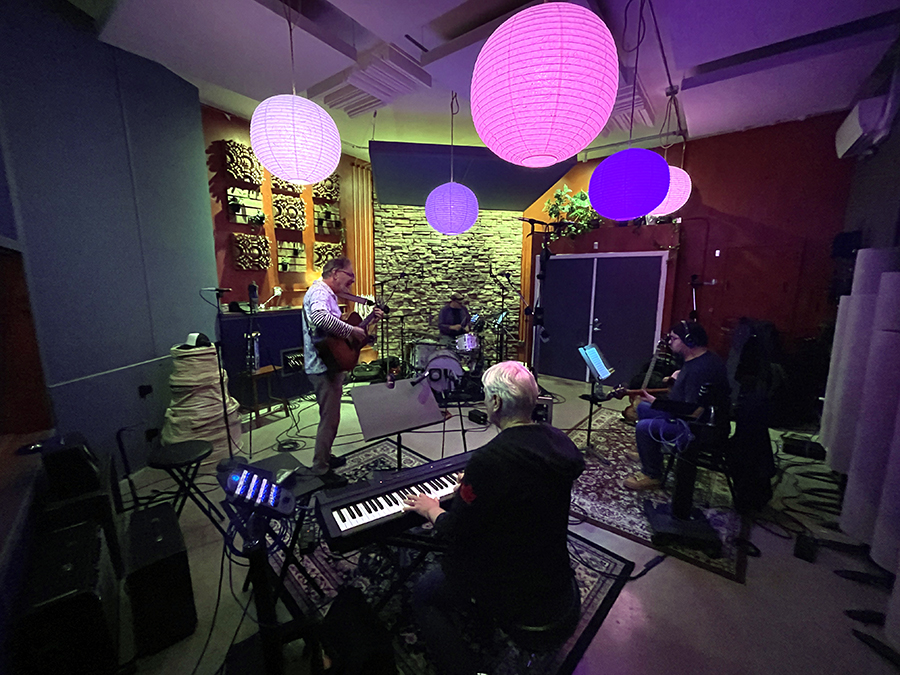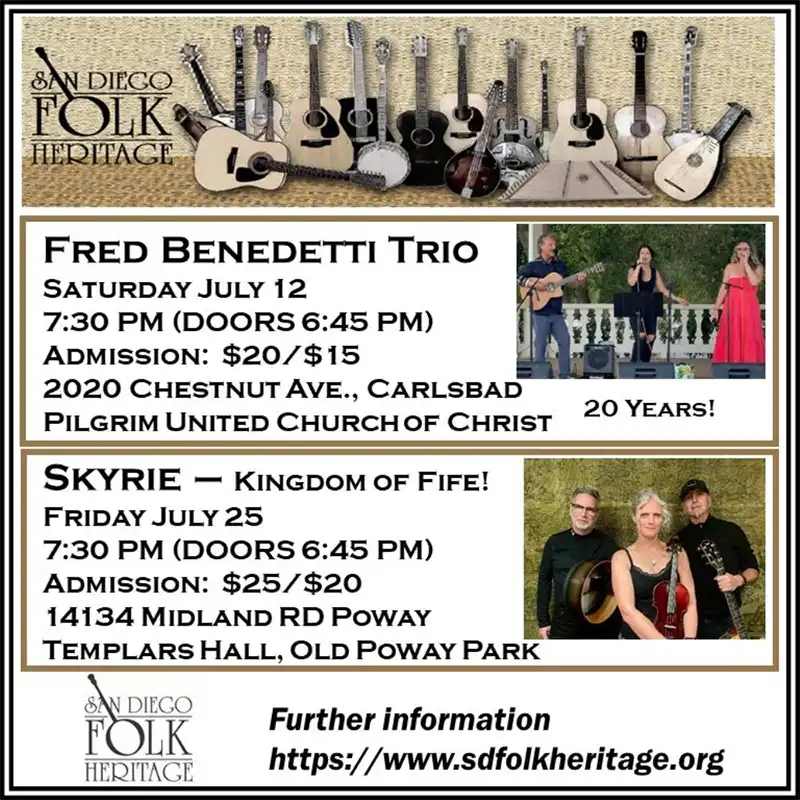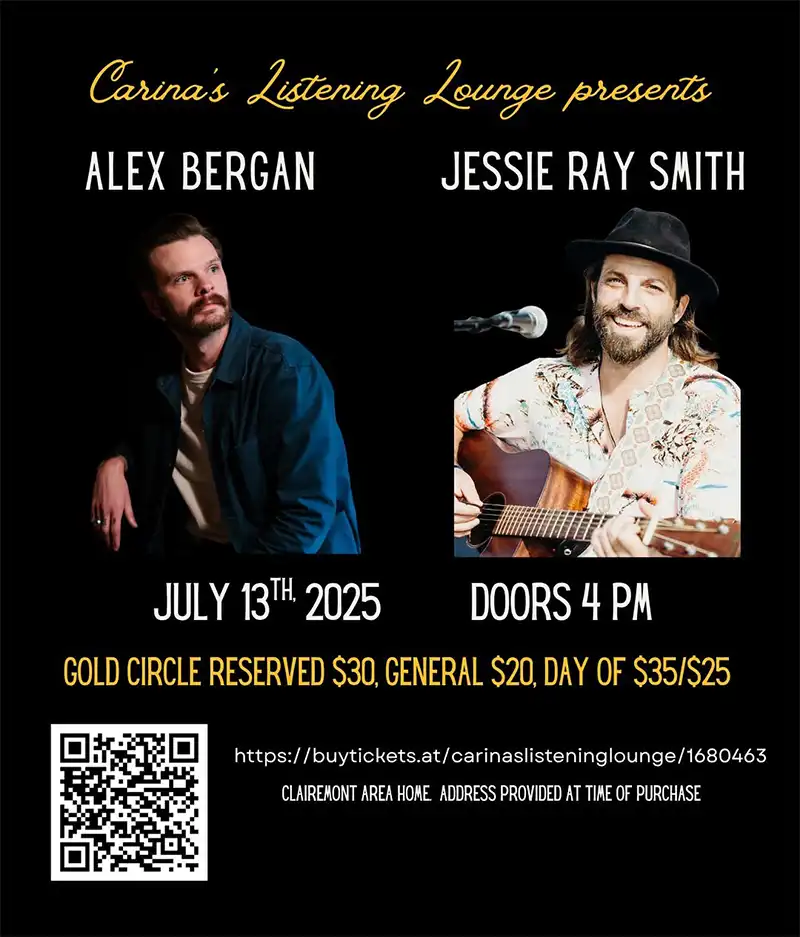Smoke Signals
Recording Matters, Part 3: Choosing and Preparing Musicians
<div class=”story-images”>

In the studio, rehearsing.
Hi! My name is Jeff Berkley. I’m from San Diego, California. I am a musician, songwriter, engineer, and producer. I spend four or five days a week at Satellite studio here in San Diego, producing records. I’ve made lots and lots of them. I’m very lucky to be able to find magic in all sorts of different types of musical situations, levels, styles, and vibes. Somehow, I can focus on what’s authentic and draw it out. I have no idea how I got here, but I sure did luck out!
This is part three of my attempt to somehow articulate my own recording method to you. As I’ve said before, it’s just my method. It works for me. It seems to work for others as well. So far, we’ve chosen, written, or co-written; edited amd “memo demo’d” the songs; and have chosen a producer and studio.
Now, it’s time to talk about the process of choosing and preparing the musicians.
This next part differs wildly from client to client. To begin with, there are obviously a million different types of artists. Solo singer songwriters as well as all sorts of singer-songwriter ensembles. There are instrumentalists, full bands, vocal quartets, choirs, and all sorts of different types of records being made.
Choosing the musicians for the record is sometimes not even part of the process. Sometimes a full band shows up at your door and there’s no decision to be made. Everything is to be recorded within that family. At that point, the gig is about learning how to become part of that family and help facilitate things from there. When you’re producing an “intact” band, the rules change a bit. You have to work within the parameters of those players and their talent and vibe. There may be limitations that come with that. Learn to make those things your friend. Limitations can be very good for art. Learning to work within the confines of a certain medium can create abundant magic! Lean into it! Learn who these people are. Draw out what’s powerful about that!
If it’s a solo or singer-songwriter ensemble or any other kind of project that requires hiring players, then it’s about listening to the songs and talking to the artist about what’s in their heart and mind. What’s their vision? For me, at that point, my years of practice really pay off. My job is sometimes all about casting. I’m able to think of the right actor for the right role.
I’ve found over the years that it’s important to bring in musicians who do the thing that you’re after rather than asking someone to do something they don’t do. You just would never ask Robert De Niro to play Superman for instance. I mean, I would love to see that movie! Maybe Joe Pesci as the Hulk? But I digress.
Think about the sound field you’re looking to create and simply hire the players who do those things naturally. If we do this job correctly, there isn’t a lot of direction that happens in the room. The artist and I will let them know what we are after in a very esoteric way. I want to leave room for the players to interpret. Verbiage is very important with these explanations. I’ve learned not to get in the artists’ and players’ way in these early stages, i.e., wrapping their ears and hearts around the songs. I’ll actually try and let everybody do a few takes before I start chiming in with rules or specifics. The conversations that happen in the studio or rehearsal room, among the musicians, artist, and I are where the real magic happens. Hopefully, everybody’s being respectful and open about ideas and to each other. All of those things can be facilitated in a healthy way by just choosing the right folks for the right job.
First, I like to trust the musicians to dial in their tones, come up with parts and vibes on their own. When you’re hiring professional musicians, it doesn’t make sense to tell them what to do all the time. I’ve learned that I am very often pleasantly surprised with musicians’ ideas for the feel and vibe I hadn’t thought of. Sometimes I know exactly what I want and it’s exactly what the musicians hear as well. When that happens, it’s because we’ve chosen the correct players.
My criteria for hiring musicians are pretty simple. I’m looking for musicians who don’t have anything to prove except for framing the lyrics and or the melody of the vocalist or instrumentalist. The song and artist are the picture. The musicians are the frame. In a perfect world, the musicians will completely immerse themselves in the song and vibe of the artist. They’ll have a perfect balance of looking to get the vibe we’re after as well as suggesting things we may never have thought of. You may not like all of the suggestions but some will change your life forever. The artist may like some, and you may not. Your name is not on the front cover; it’s about helping the artist achieve their heart’s vision. Figure out how to make it work for them. Even though you disagree, I’ll bet there’s a way to find common ground and get them what they’re after. Having the right players in the room will make this job a million times easier. When hiring musicians, I’m looking for a balance of talent, tone, creativity, magic, and good vibes.
It’s so much fun and so rewarding to have as much of the full band record together as possible. Lead vocals or instrumentalist, too. The vocals or lead instrumental tracks can be scratched, but you may as well be set up to catch them if they happen to get it. I get a really big percentage of lead vocals finished in those moments, because the singers are sometimes very inspired by having the band there with them. That doesn’t always work for all kinds of reasons. Studio size, isolation options, budget, and so many other things can make it tough to get everybody in the room together.
If you can possibly swing it, I highly recommend it. It saves hours and hours in the editing room to make things sound like people are playing together. When they actually ARE playing together, all those editing moves just happen naturally. It can make a huge difference when the musicians are listening to the song and each other, as well as actually watching and queuing each other with body language. Personally, I do a lot of cueing from the producer’s chair as well. Sometimes I’m doing it with my guitar part or nodding my head or raising my eyebrows at certain times to let the drummer know things. Sometimes I’m cueing the artist when to come in because we’ve changed an arrangement and they aren’t quite sure anymore. There are all sorts of things that can be made so much more easily by just being in the room together.
I’m lucky to work with lots of wonderful musicians. Over the years, I’ve worked out all sorts of shorthand for cues and communicating about songs. This comes with time and with loyalty.
There are other important reasons why a particular musician is chosen. It’s not always about musical prowess. Sometimes, it’s about getting someone on the record that means a lot to you. Maybe they aren’t the most talented singer but having their voice or playing on a song can mean the world to them or you. When I first started out, I didn’t make much room for this, but I’ve learned over the years that these are the things that make life good. Get those friends on there but learn how to do it in a way that serves the song. It’s not always easy; in fact, most of the time it’s difficult to do without hurting feelings. Managing folks’ feelings and emotions is 90% of this job. There is a way to do it with kindness and empathy. I fail it this all the time. I work on it every day.
That all being said, there is a danger in hiring friends. First, it’s harder to tell a friend to do something you want them to do and hold them to it. Very often, the friend is not versed in the thing you actually need for the song. There’s nothing worse than not being able to use the thing the friend recorded. They end up feeling badly and so do you. So. definitely get some help when you want to have friends play on your record. Sometimes our friends are also pros and that’s wonderful! Sometimes we need our friends to help us because there isn’t the budget for it. There is room for all of that.
Now that you’ve chosen your musicians, it’s time to send your memo demos to them. Different artists have different comfort levels about sending the memo demos. After all, it’s just a cell phone recording of them doing the song in a very raw and vulnerable way. Some artists like to actually book a session to create more “professional“ demos. Basically, a guitar or keyboard, playing the song to a click on and the vocalist or instrumentalist, playing or singing the melody and lyrics. Sometimes the memo demos aren’t quite descriptive enough for the musicians to get what they need so we make more professional ones. It’s really up to the client. It’s also dependent on how well your musicians can listen to a raw demo and interpret what’s needed.
At this point, some producers will create charts for the musicians. if you know how to make accurate charts for musicians, I highly recommend this. Almost all of the musicians I’m around like to have the demos. They will show up with notes or even full charts of their own. Don’t get me wrong, they love if you’ve got an accurate lyric sheet or a chart for them. Generally though, they are prepared when they arrive. This can’t be expected of everyone. Not everyone has the time to sit down and make charts. It’s quite amazing. That musicians go to that trouble anyway. I’m so very thankful for that! It’s one of the reasons professional musicians charge a healthy rate for their services. They show up prepared, do their job efficiently, quickly, and with power and magic.
Once the musicians have the demos, I love to have a rehearsal if it’s possible. Very often, it’s not possible. It can be a little more expensive to pay for the musicians’ time and sometimes it’s just really difficult to get everyone together, especially busy musicians. I DO have lots of success simply with working on the songs in the studio or in the moment. rehearsals are a bit of a luxury, but I still love them.
If you can rehearse the band and make cell phone recordings of those rehearsals, it can be very helpful once you reach the studio. There are lots of arrangement and instrumentation decisions that can be made at rehearsals. The artist, musicians, and producer should all be there. If there’s a separate engineer, I usually like to have them come in for the very last rehearsal before sessions to get an idea of what will be needed technically. At rehearsal or in the room, we are listening to the demo and working to interpret and arrange the song in a way that suits the artist’s vision and draws out the best performance and essence of what each artist and musician is and does.
Now, for some sessions, a rehearsal can “take the sport out of it.” (Bob Weir said this to Tim Flannery). The chief didn’t want to rehearse because it took that pure moment of improvisation and creativity out of the picture. Those unrepeatable moments can be beautiful to record. It just depends on your vision, the artist’s type of music, and all of the ingredients.
Either at rehearsals or in the studio, time will be spent talking through the arrangements and playing the songs to make sure everything is flowing correctly. At this point you will hear things that need to be edited. Choruses, verses, and bridges that need to be moved or taken out, and intros and outros that need to be lengthened or shortened. Musical themes will start to emerge for the intros, outros, and head sections. There will be tempo changes and key changes. All of that should be documented with a new memo demo with the full band, at rehearsal. This will give you the ability to listen back to what you decided at rehearsal if needed. Obviously, if you’re making these decisions in the studio, there’s no need for a new demo. You’ll just record it.
Choosing your crew and musicians can’t be understated. It really is the whole ball game. Getting the right folks in the right room is crucial. It will dictate the way the sessions go and how everybody feels as they happen. Just like making soup, every little ingredient matters. Heat, stirring, and spicing as well as patience, courage, and creativity all create big, big magic!
These songs become the soundtracks of our lives. They help mark the time we spend on earth.
Recording matters!






